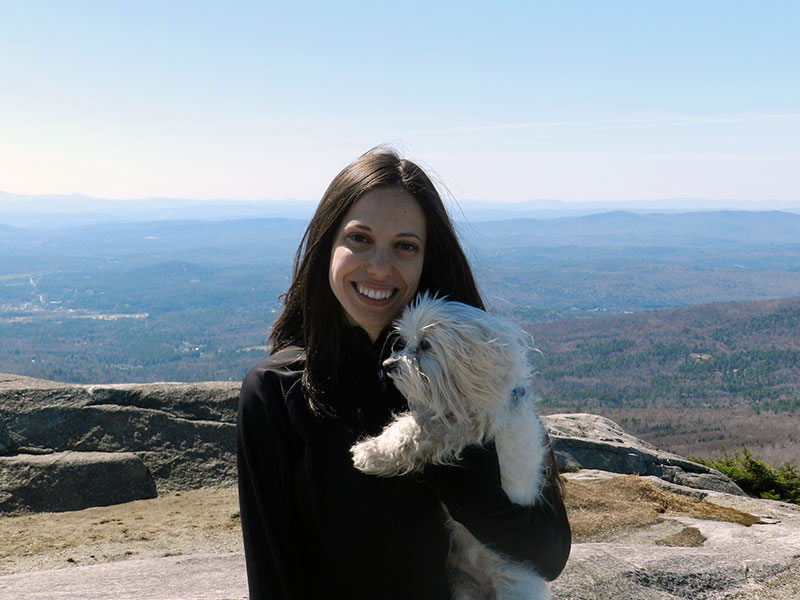The Geisel Experience - Adina Fischer
As a 12-year-old, Adina Fischer moved with her family from Albany, NY to Yuvalim, a small town in Northern Israel.
Life in Israel was difficult for Fischer and her four younger sisters-none of them spoke Hebrew. School was a tremendous challenge, and in order to overcome the language barrier she diligently looked up every word in the dictionary so she could do well in her studies.
"School was a struggle, but I excelled in math and science," she recalls. "It took four years for me to catch up, by high school I did well in all of my exams."
Mandatory military service in the Israel Air Force proved to be another challenge for which she wasn't prepared. "We all knew people our age who were killed during their military service," she says. "It was devastating."
Both experiences were formative, but her military experience gave rise to an interest in psychiatry and a desire to help people during their time of greatest need—a desire, she points out, that was rooted in passion rather than knowledge.
Untangling the mysteries of the brain captured Fischer's imagination. When she left Israel for college, she studied brain and cognitive sciences at Massachusetts Institute of Technology in Cambridge, MA, where she also spent two years as a researcher in the university's early childhood cognition lab.
"I was interested in both medicine and research and wanted to figure out how the brain works," Fischer says. "But biology and understanding how the human body works was equally compelling. I couldn't choose."
Fischer didn't need to. She was accepted into Geisel's MD-PhD program in Experimental and Molecular Medicine where she was free to pursue both interests. After completing her first two years of medical school and receiving her PhD this year, Fischer is finishing her medical education.
"Dartmouth is the perfect setting for me to further my studies," Fischer says. "The small class size and close mentoring ensures that my education is tailored to my individual interests and future career goals."
Building on her undergraduate experience with neuroimaging, Fisher's PhD research involved investigating brain reward circuitry in schizophrenia to advance an understanding of underlying neural circuitry impairment, which could contribute to the development of more effective pharmacotherapies.
"Working with psychiatric patients in a research setting is a different experience than working with them in a clinic," Fischer says. "I hope to channel my research in a direction that changes the way we practice psychiatry—it would be great to integrate pharmacotherapy with other counseling interventions."
Although not specifically related to her research, but important to her personally, Fischer is interested in the clinical aspects of a preventative approach to Post Traumatic Stress Disorder (PTSD). PTSD is a mental health problem than can occur after a person experiences a traumatic event such as war, assault or disaster.
While talking to Fischer, it's clear this is something she's passionate about.
My classmates are so smart and driven, they really pushed me to challenge myself.
Last year, she created Geisel Disaster Relief, a collaboration of Geisel School of Medicine, the National Center for PTSD and Friends of Firefighters in New York City to obtain training in and then offer Skills for Psychological Recovery (SPR).
This spring, she organized and led a Hurricane Sandy relief SPR trip to New York City to work with fire department first responders and community members affected by the hurricane.
"We really made a difference," Fischer notes with satisfaction. "And we're returning to New York this summer, Friends of Firefighters was pleased with our work and really happy we were there."
The group is also offering SPR to Hurricane Irene survivors in Woodstock, VT sometime later this summer.
"I'm convinced that disaster relief training is something that all medical students need," she says. "We don't know when, as doctors, we'll have to treat someone who experienced a hurricane or other natural disaster or who was a victim of terrorism."
For Fischer, it's all about applying the knowledge she's gained.
"At Geisel you're surrounded by so many smart and driven people who listen to your ideas and encourage you to push yourself to make them a reality," she says. "I'm proud to be part of such an engaged group of people who are really trying to make a difference."
As a physician-scientist, Fischer is poised to make important contributions in neuroscience that will have the potential to improve the lives of people with psychiatric disorders.
